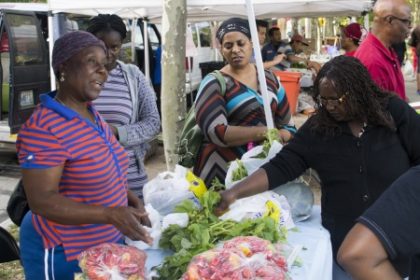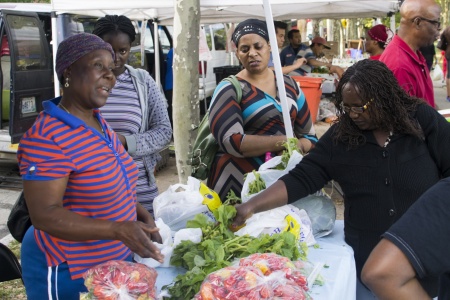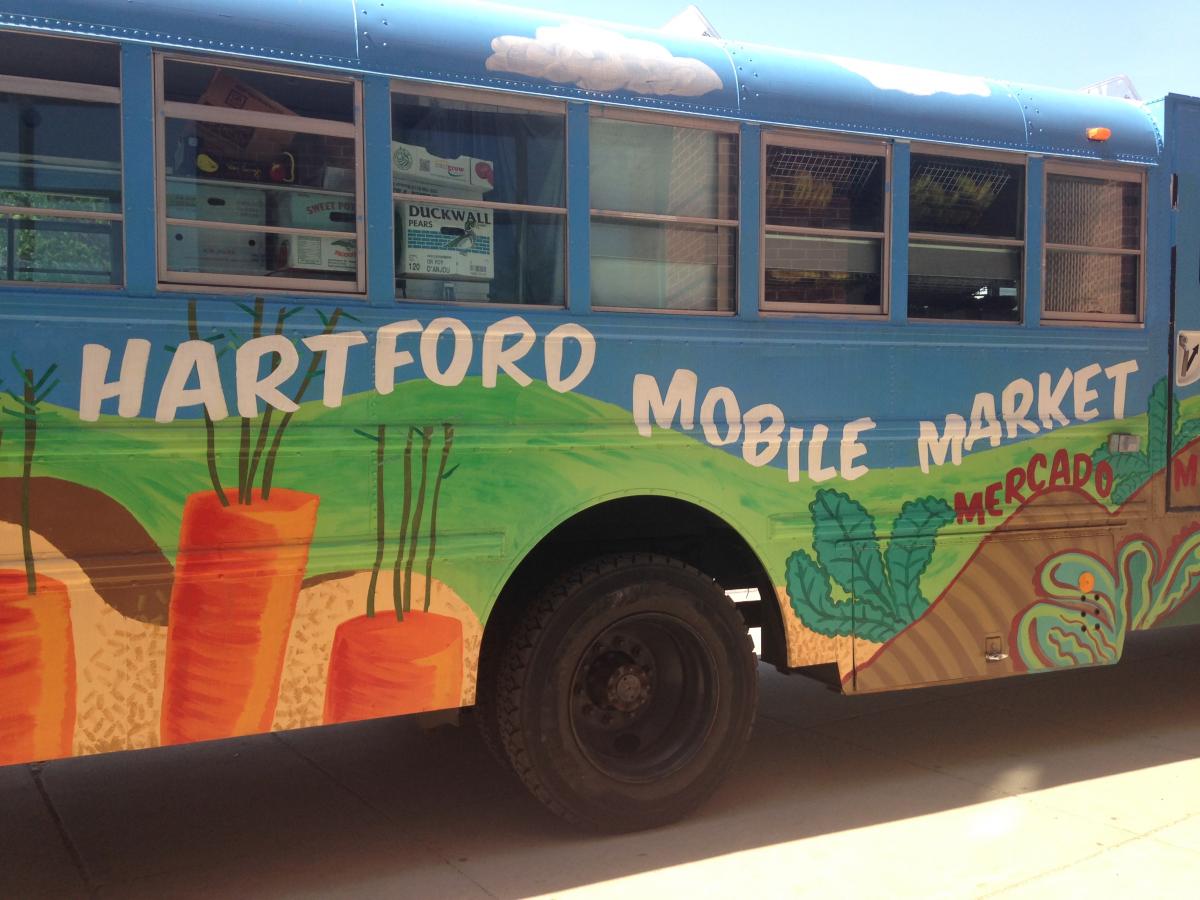
Rhode Island
 The Rhode Island Food Policy Council (RIFPC) staff, Communications and Outreach Director Sumana Chintapalli and Network Director Leo Pollock, present a 2015 year in review
The Rhode Island Food Policy Council (RIFPC) staff, Communications and Outreach Director Sumana Chintapalli and Network Director Leo Pollock, present a 2015 year in review
2015 was an exciting and fulfilling year for the RIFPC. It was a year of transition: they welcomed a new staff member, a new cohort of Work Group chairs, and launched a fifth Work Group centered around health and, relatedly, held their first food- and health-focused event. It was also, however, a year that cemented the RIFPC’s role as a strong advocate and resource for local and regional food system development, and a community organizing force to support State action.
RIFPC is seeing many of the goals around which they launched their organization coming to fruition. From Governor Raimondo’s administration speaking about food as an economic strength and priority area, to organizations and agencies focusing more on the food system and collaborating in synergistic ways, food is gaining attention in Rhode Island. For example, RIFPC had a great experience working together with Hope & Main, URI, and UMass to hold the first Food Safety for Product Development Workshop at Hope and Main’s campus and we have several RIFPC members holding Advisory Council mentorship roles in Social Enterprise Greenhouse’s first food focused accelerator program. These examples underscore their underlying focus of network-building, ensuring resources go into supporting on-the-ground efforts and collaboration rather than organizational overhead.
In 2015, RIFPC developed and released their first ever series of Rhode Island Food System Snapshots. These fact sheets help illustrate the social, environmental, and economic context of food in local communities, and help Rhode Islanders – from community members to policy makers – better understand the concept and consequence of the food system in its entirety. Also in 2015, RIFPC completed another exciting round of the Local Agriculture and Seafood Act (LASA) Grants Program, a unique public-private partnership between the RI Department of Environmental Management (RIDEM) and the RIFPC funded with public and private funds. With a dedicated group of LASA Committee members reviewing applications, LASA award recipients were recognized on May 28th at the annual Rhode Island Agriculture Day celebration at the RI Statehouse. Wholesome Wave’s Michel Nischan provided the keynote address and First Gentleman Andy Moffit also spoke.
RIFPC has much to look forward to in the New Year. Their focus in 2016 will include supporting efforts to develop a State Food Plan with the understanding that food is not only about tourism, but is a sector instrumental to quality of life from an environmental, social, and economic standpoint. Strategic communications and data will be on their radar, especially as they work on the second iteration of the data-informed Food System Snapshots. They will continue to co-manage a third year of the LASA Grants program with RIDEM, and look forward to once again having an opportunity to see the impressive caliber of applicants driving innovation and strengthening the food system and economy in Rhode Island.
RIFPC says “Thank you” for the generous contributions of the following funders, without whom none of their work would be possible: The Henry P. Kendall Foundation, John Merck Fund, Rhode Island Foundation, and van Beuren Charitable Foundation. They are grateful to have had such an eventful year and look forward to harnessing and amplifying this momentum as they make waves in the New Year!
Read more stories from Rhode Island about efforts to bring fish to farmers markets through a partnership between the African Alliance of Rhode Island and the Northwest Atlantic Marine Alliance with funding from the New England Grassroots Environmental Fund, Farm Fresh Rhode Island’s Farm to Senior Program, food system planning on Aquidneck Island, food service workers’ campaign for a living wage, and more.
Connecticut
Highlights from 2015 blog posts
On October 26, the White House recognized 12 individuals from across the country as White House Champions of Change for Sustainable and Climate Smart Agriculture. Connecticut’s Jiff Martin was selected as one of the recipients.
Jiff Martin is the Sustainable Food System Associate Educator for UConn Extension, and has worked for over 12 years on food and agriculture issues in Connecticut, helping residents discover local agriculture, connecting kids to healthy, whole foods, and researching community food security in Connecticut’s 169 towns. Her recent work includes leading a team of Extension Educators to assist new farmers in production and farmland management; directing two AmeriCorps service learning programs; and educating consumers through BuyCTGrown.com’s 10% Campaign, under which residents and businesses are asked to pledge 10 percent of their food and gardening budget to locally-grown products. Jiff was previously State Director for the American Farmland Trust and Food Policy Director at Hartford Food System. She is also a member of the Food Solutions New England Network Team.
The Americorps programs Jiff has led have helped to cultivate a culture of youth leadership in the Food Justice Movement in Connecticut. Americorps members have teamed up with high school youth to form the Food Justice Youth Corps (FJYC). They designed the School Your Food Initiative, which hosted an event in April of 2015 that attracted over 80 people from around the state, as well as some outside guests.
In a repost of Bill Duesing’s Two Visions Revisited from the CTNOFA blog, he highlights the positive movement toward growing food for people near where they live with theexplosion of gardens, small farms, community farms, college farms, farmers markets, and food and farming related organizations over the last two decades. Each of these inspires and connects more people directly with their food:
In 1997, the Hartford Food System and at the time, all-volunteer CT NOFA had been around for about 20 years and Common Ground High School (on a farm in New Haven) was just beginning. The founding of the Working Lands Alliance and from that the Connecticut Farmland Trust wasn’t even on the drawing board. Farmers markets were few and mostly small. There were only a handful of CSAs (Community Supported Agriculture farms) offering a weekly share of the produce.
In this century, notable markets such as CitySeed‘s four in New Haven and the famous Coventry Regional Farmers Market got going. Those markets and others all over the state stimulated farmers to produce more food and grow more kinds of crops for a longer season. They encouraged a wave of new and young farmers which in turn encouraged CT NOFA and UConn to begin beginning farmer-training programs. The new farmers started their own organization, the New CT Farmer Alliance.
Community Farms are one of the most promising of these developments. They are run by non-profit, community-based organizations to produce food for people where they live, to provide education and a connection to the soil. Bridgeport, Hartford, New Haven, New Britain and New London all have one or more community farms. Many suburban towns have them too, connecting with school children and enthusiastic volunteers from local businesses. The Community Farm of Simsbury trains new organic farmers as well as providing food for the needy.
Land trusts and churches are growing food for food pantries and towns are establishing Agriculture commissions. There’s now a Connecticut Food System Alliance.
In addition to youth working for better food in schools, it’s exciting to see other institutions, including hospitals, getting on board. In Back to Basics and Beyond Charity Care, Marydale DeBor, Founder and Managing Director of Fresh Advantage® LLC, details the important role hospitals can play in helping to expand access to nutritious foods produced by strong and local regional food systems through their “Community Benefit” Activities. In May 2015, the Connecticut Food Policy Council convened a state-wide Summit to explore opportunities for hospital-community collaboration to strengthen food and nutrition programs and food systems that can prevent hunger and food insecurity. More than 100 representatives of Connecticut tax-exempt hospitals, public health and social assistance agencies, local farmers markets, urban farmers, and other food system stakeholders took part.
The Connecticut Food System Alliance held the first of three 2015 Gatherings in February on the theme Food and the Economy. The May Gathering focused on Food Systems and Climate Change and in December, the group explored how social justice and systems of oppression intersect with food access. In December, the Gathering also highlighted some of the great work happening around food justice in Bridgeport.
Other notes
In the fall, Tekowa Omara-Otunnu joined the Connecticut Food System Alliance as their new Coordinator. Food Solutions New England is happy to welcome her to the Network Team in 2016.
In October, Food Solutions New England held an Emerging Leaders summit in Hartford to engage emerging leader delegates from past New England Food Summits, as well as other young leaders in Connecticut working to create a more just and sustainable food system.
Bridgeport, CT will be the host for the June 2016 New England Food Summit.




